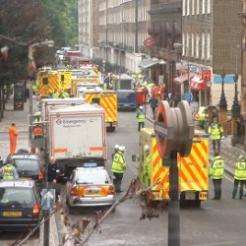The Charity Commission has found no evidence to suggest that charitable funds from Iqra, a charity embroiled in the 7/7 London bombings when four of its trustees were found guilty of involvement, was used to facilitate the attacks.
The Charity Commission opened a statutory inquiry to investigate whether Iqra may have been used to facilitate terrorism and to secure the assets held by the charity after two of its trustees, Mohammed Siddique Khan and Shehzad Tanweer, died committing the attacks on 7 July 2005. A further two trustees, Khalid Khaliq and Waheed Ali were later convicted of terrorism related offences.
The investigation found that there was no evidence that the charity's funds had been used to fund the attacks but was unable to determine whether the charity's premises had "provided a meeting place for the perpetrators or been used as a platform of legitimacy for terrorism sentiments".
Iqra registered as a charity on 14 February 2003 with the purpose of "advancement of the Islamic faith through lectures study groups literature or by such other charitable means as the trustees may from time to time determine". Following the attacks and the arrest of Kaliq, Ali and fellow trustee Sadeer Saleem, who was later acquitted of assisting in the preparation of acts of terrorism, the charity ceased to operate in 2005 after the remaining trustees disassociated themselves.
Seized material 'propagandist'
Approximately one fifth of the material seized by the police from the charity's bookstore and lending library was found by the inquiry to be "political, biased, propagandist or otherwise inappropriate for the advancement of the Islamic faith". A seized video named 'What I have learnt about American Foreign Policy' contained details of CIA covert missions and was unrelated to Islam or Islamic countries. A leaflet distributed by the charity advised on the treatment of individuals subject to arrest interrogation or torture.
There had also been mismanagement in the administration of the charity, which failed to submit any accounts to the Commission during its existence. The investigation found that its income had reached in excess of £94,000 until July 2005 and therefore was legally bound to submit accounts, passing the £10,000 threshold for submittal.
The Commission concluded after reviewing financial records and a published report presented to Parliament, however, that none of these funds had been used in the attacks which appear to have been primarily funded by the bomber Khan himself by methods "related to terrorism or other serious criminality" and various credit sources.
After the charity's closure the remaining trustees failed to take appropriate action to secure the proper application of the remaining £12,500 of charity funds, held in four bank accounts, and the Commission has now seized these fund to ensure they are put to appropriate charitable purpose.
The inability to communicate with the perpetrators of the attacks, due to their deaths, presented a barrier to the Commission in determining whether the premises was used as a location to organise the bombings. While it was unable to provide a definite conclusion, the Commission raised concerns that documents found on the charity premises relating to organised outdoor activities not relevant to the charity could be indicative of facilitating the attacks. The Commission advised that this was because the official report of the bombings listed such activities, which included camping, canoeing and white water rafting, as "common factors for the 7 July bombers and other cells".










